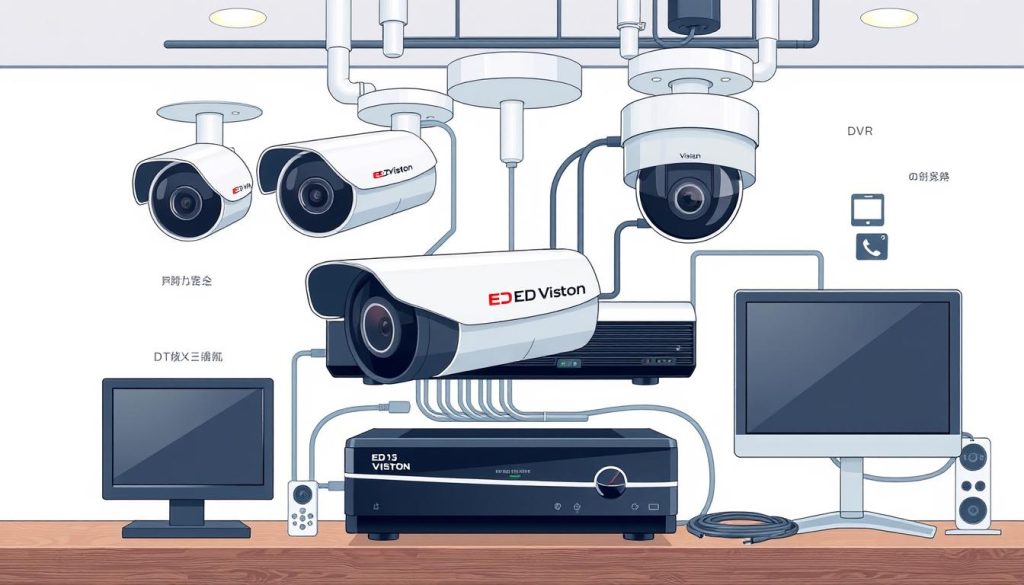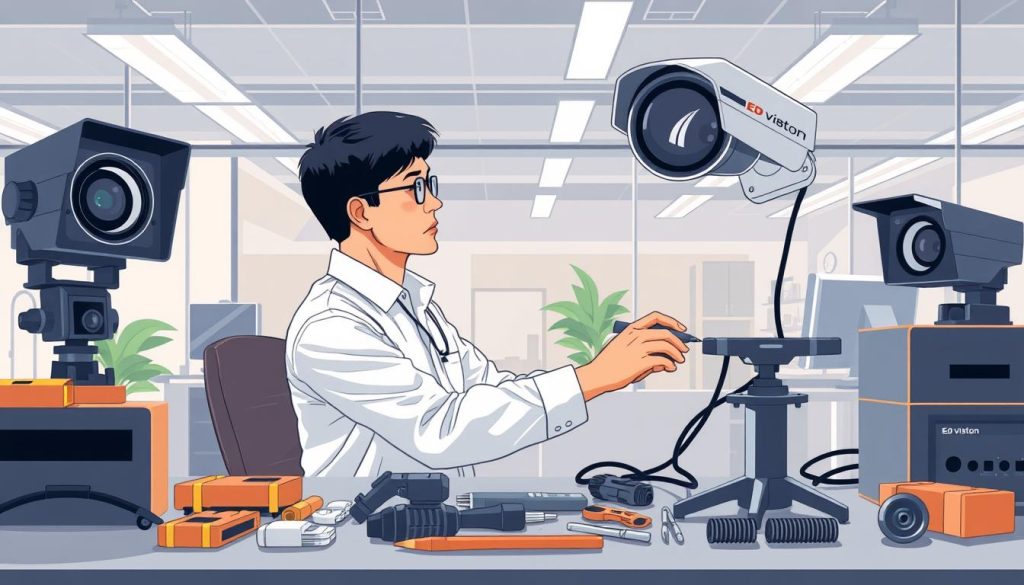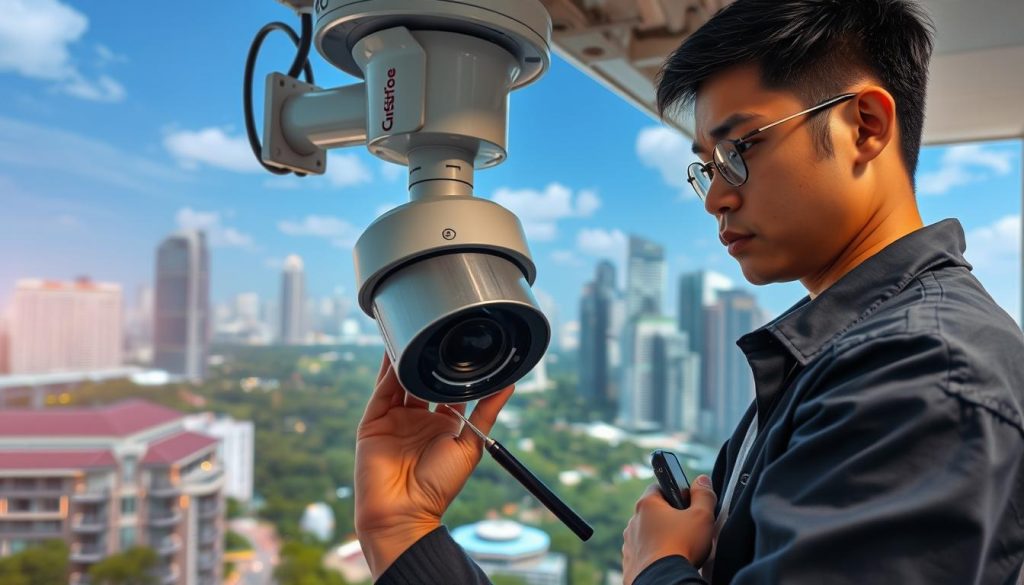In Singapore, keeping your security cameras in top shape is key. It boosts your safety and security. Regular checks and upkeep are vital to avoid sudden breakdowns and expensive fixes.
This article will cover why routine service is important. We’ll also talk about common issues, best practices, and tips for Singapore’s unique environment.
Key Takeaways
- Regular cleaning of camera lenses is recommended at least once every three months for optimal performance.
- Weekly testing of recording devices helps catch any glitches, making your system more reliable.
- Look for frayed wires or corroded connectors often to prevent failures.
- Each type of security camera has its own maintenance needs, affecting how long it lasts.
- Think about hiring professionals for maintenance at least twice a year, based on your system’s needs.
- Having a set maintenance schedule, including weekly, monthly, and yearly checks, keeps your system running smoothly.
- Regular maintenance can cut down equipment failures by up to 30%, ensuring better performance and reliability.
Importance of Regular CCTV Maintenance
Regular maintenance for security cameras is key to their success. It keeps systems running smoothly and lasts longer. By getting professional help, businesses can keep their surveillance systems in top shape.
Enhancing System Performance
Improving system performance means doing a few important things. Cleaning camera lenses and checking connections helps avoid problems. This includes signal loss and poor image quality.
Studies show that well-kept CCTV systems are 70% more likely to capture clear footage. Regular checks and fixes can cut down system failures by up to 40%.
Increasing Longevity of Equipment
Keeping CCTV equipment in good shape is possible with planned maintenance. Data shows regular servicing can add up to 30% to a camera’s life. Older systems need more maintenance, which can increase costs.
It’s wise to consider upgrading if your equipment is old. Newer systems have better features like higher resolution and low-light performance. This upgrade strategy can save on maintenance costs and boost efficiency over time.
Understanding the Types of Security Cameras
Knowing about the different security cameras is key to keeping them running well. Each type needs its own care, based on how it works and what it does.
Wired CCTV Systems
Wired CCTV systems are dependable. They give a steady video feed and work well with a constant power source. It’s important to check the cables and connections often to keep them in top shape.
Wireless CCTV Systems
Wireless CCTV systems are great for easy setup. But, they can get affected by other electronic devices. Keeping an eye on signal strength and battery life is important to avoid problems.
IP-based CCTV Systems
IP-based CCTV systems use the internet for video, allowing for remote viewing and cloud storage. They need updates and network checks to stay secure. This makes them a bit more challenging to maintain than others.
Analog CCTV Systems
Analog CCTV systems are straightforward but need regular upkeep. Checking the image quality and wiring is essential. Even without the latest tech, they’re important for keeping an eye on things.
Security Camera Maintenance Best Practices
Keeping your security cameras in good shape is key for their best performance and life span. By following the right steps, you can make sure your CCTV system works well when you need it most. Here are some tips to keep your security system running smoothly.
Cleaning and Inspection Protocols
Regular security camera cleaning is a must for CCTV upkeep. Clean camera lenses every three months to avoid a 20% drop in image quality. Also, check your system monthly for damage or issues.
Look out for loose or damaged connections, as they cause about 30% of system failures. Make sure cables are tight and check for wear.
Regular System Updates
Updating your CCTV system’s software and firmware is vital. It boosts camera performance by up to 15% and improves security. Update your system regularly to avoid problems.
Test and calibrate your system every quarter to cut down on false alarms. These tips will keep your system running well and reduce the chance of breakdowns.
Having a regular maintenance plan is vital for your security system’s health. It ensures your system works as it should at all times. For more on CCTV servicing, check this guide for more details.
Key Components of a CCTV System
Understanding the parts of a CCTV system is key for good surveillance. Each part has its own role in making the system work well. Keeping these parts in good shape helps keep your security strong.
Cameras
Cameras are the core of a CCTV system, capturing important footage. There are many types, like dome, bullet, and PTZ cameras, for different needs. Keeping the camera lenses clean is important to avoid dirt and blockages.
Installing cameras right and in the right place is also key. It helps cover more area and reduces blind spots, making surveillance better.
Digital Video Recorder (DVR)
The DVR is vital for storing video from cameras. It’s important to keep the DVR working well to avoid losing data. It needs regular software updates to stay secure and functional.
Also, you might need to upgrade the storage as high-resolution cameras use a lot of data. Having enough storage is important for keeping everything backed up.
Cables and Connectors
Cables and connectors are needed for the system to talk to each other. It’s important to check them often for damage or wear. Using good connectors, like BNC for analog and RJ45 for IP, helps keep connections strong.
Regular checks can help avoid connection problems. This keeps your CCTV system running smoothly.

Common CCTV Maintenance Issues
It’s key to know about common CCTV maintenance issues to keep systems working well. Problems like camera lens issues, wiring troubles, and storage problems can happen. Regular checks can solve these issues, making security better and giving peace of mind.
Camera Lens Problems
Issues with the camera lens can really affect video quality. Some common problems are:
- Dirt and debris on the lens blocking the view.
- The lens being off-center, causing distorted images.
- Old firmware settings that lower performance.
Cleaning and adjusting the lens regularly is vital. It keeps the video clear, which is important for good monitoring.
Wiring Issues
Wiring problems can come from many sources, like:
- Worn-out or damaged cables that mess up signal transmission.
- Loose connections causing video to cut out.
- IP address conflicts in networks with many cameras.
Checking wiring often can spot these issues early. This means fixing them before they cause big problems.
Storage Problems
Good storage management for CCTV is essential. Common storage issues are:
- Not enough space for recordings, leading to overwriting.
- Cloud storage problems that make it hard to get footage.
- System settings that don’t handle data retention right.
Fixing these storage issues is key. It keeps important recordings safe, which is vital for security in all places.
| Issue | Common Causes | Recommended Solutions |
|---|---|---|
| Camera Lens Problems | Dirt, misalignment, outdated settings | Regular cleaning, adjustments, firmware updates |
| Wiring Issues | Frayed cables, loose connections, IP address conflicts | Routine inspections, secure connections, network checks |
| Storage Problems | Inadequate capacity, cloud storage issues, management failures | Capacity upgrades, service audits, setting evaluations |
CCTV Maintenance Schedule
Having a detailed CCTV maintenance schedule is key to keeping surveillance systems running well. Regular checks spot problems early, saving money on repairs. Here are the must-do tasks for system upkeep.
Weekly Checks
Weekly checks are vital for keeping systems at peak performance. They involve checking each camera’s function and adjusting angles if needed. Here are the key tasks:
- Check power supply and connectivity to the cameras.
- Review recording status on the digital video recorder (DVR).
- Ensure that motion detection sensors are working effectively.
- Inspect for any obstructions affecting camera views.
Monthly Inspections
Monthly checks go deeper into system performance. They include cleaning and adjusting for better image quality. Key monthly tasks are:
- Cleaning the camera lenses with appropriate techniques, such as using a microfiber cloth.
- Testing DVR performance to ensure a smooth recording process.
- Updating software and checking for firmware updates to enhance security.
Quarterly and Annual Reviews
Quarterly reviews are needed in high-traffic areas, ideally every four months. Annual professional evaluations are also critical. They focus on:
- A thorough check of all wiring and cable integrity.
- Identifying and addressing wear and tear that may lead to system failure.
- Ensuring all components are in optimal condition, preventing premature breakdowns.

Following this CCTV maintenance schedule improves performance and reduces risks. It keeps systems effective for surveillance.
Security Camera Maintenance Checklist
Keeping your CCTV systems in top shape is key. Regular checks and maintenance stop common problems. This ensures your surveillance works well. Here are the main areas to check for general upkeep and specific parts.
General Maintenance Items
- Make sure the date and time are right to get accurate timestamps on your footage.
- Clean the camera lenses often to improve visibility. Clean lenses can make footage up to 70% clearer.
- Check cables and connectors for damage to avoid problems.
- Look around cameras to keep them clear of dirt or debris.
- Test wireless camera batteries every 6 to 12 months to avoid sudden failures.
Specific Component Checks
| Component | Maintenance Action | Frequency |
|---|---|---|
| Camera Focus | Adjust and test focus for clarity | Monthly |
| Power Supply | Verify integrity and connection | Monthly |
| Storage Capacity | Check and upgrade DVR/NVR when capacity reaches 70% | Quarterly |
| Firmware Updates | Apply updates to enhance security features | As released |
| SIGNAL Strength (IP Cameras) | Assess and optimize network signal | Monthly |
CCTV Maintenance Tips for Singapore’s Climate
Singapore’s tropical climate poses challenges for CCTV systems. High humidity and rain can harm security cameras. Effective maintenance tips can help keep systems working well.
Dealing with Humidity
Managing humidity is key for CCTV performance. Cleaning camera lenses regularly is vital. About 67% of camera issues come from dirty lenses.
Cleaning every three months keeps images sharp. Dirty lenses can lower quality by up to 50%. Waterproof enclosures also protect against moisture, which affects 22% of cameras.
Addressing Environmental Challenges
The Singapore climate can damage CCTV systems if not managed. Loose or damaged cables cause about 45% of failures. Secure connections and proper cabling reduce this risk.
Regular checks, every three months, help spot issues early. Updating system firmware can boost security by up to 80%. This strengthens your CCTV setup.
Do CCTV Cameras Need Maintenance?
Yes, do CCTV cameras need maintenance to work well. Not keeping up with maintenance can lead to problems like cameras not working or missing spots. Regular checks help keep the quality of images high and the equipment running smoothly.
It’s smart to check CCTV devices every week or two. This helps catch small issues before they get big and expensive. You should check power supplies, lenses, and digital video recorders (DVRs) often. Issues with power can harm older devices, causing poor quality or no live feeds.
Inspections should include cleaning lenses weekly, checking connections monthly, and making sure storage devices work right. Regular care can cut down system downtime by 95%. It also makes sure CCTV systems work their best.
For more on why regular checks are key, think about getting professional maintenance. This can save up to 20% on maintenance costs and cut downtime. Professional checks can also lower theft by 50% and make you feel safer.
| Maintenance Frequency | Inspection Tasks | Benefits |
|---|---|---|
| Weekly | Clean lenses | Improves image quality |
| Monthly | Connection checks, inspect storage devices | Avoids data loss and ensures functionality |
| Every 6 Months | Full system health check | Extends equipment lifespan |
| Annually | Firmware updates | Improves system speed and addresses security flaws |
By focusing on maintenance, users get reliable and effective CCTV systems. This boosts security in any setting.
Contact Professional CCTV Maintenance Services
For top-notch CCTV solutions in Singapore, it’s key to contact professional CCTV maintenance services. It’s wise to have your systems checked at least once a year. This ensures they work well. In busy or tough spots, getting help every few months can prevent big problems.
Huntaway offers on-site maintenance, including regular checks and quick fixes for emergencies. Their team is well-trained on the latest tech. This means your CCTV systems will work better and more reliably, keeping your place safe.
Getting a maintenance plan can save you money in the long run. You can pick a plan that fits your budget. For the best CCTV care, call ED Viston at +65 8313 4578. They offer custom plans to keep your systems running smoothly.
FAQ
Why is regular maintenance important for security cameras?
How often should I clean my CCTV cameras?
What types of CCTV systems require different maintenance approaches?
What are common issues that arise with CCTV maintenance?
How can I establish an effective CCTV maintenance schedule?
What should be included in a security camera maintenance checklist?
How does Singapore’s climate affect security camera maintenance?
Why should I consider professional CCTV maintenance services?
Can neglecting CCTV maintenance lead to serious problems?
Source Links
- https://wenhong.com.sg/do-cctv-cameras-need-maintenance/
- https://cctvmaintenance.com.sg/types-of-maintenance-of-cctv-in-singapore-explained/
- https://www.linkedin.com/pulse/importance-regular-cctv-camera-maintenance-upgrades-chandan-kumar-mr4yc
- https://www.spottersecurity.com/blog/regular-maintenance-cctv-systems/
- https://wenhong.com.sg/what-are-the-types-of-maintenance-of-cctv/
- https://www.pelco.com/blog/types-of-cctv-cameras
- https://www.surveillancezone.com.sg/cctv-maintenance-and-best-practices-for-security-systems/?srsltid=AfmBOoqVMSG3a_oYmB5olI-x6FstfoCKmHMM_bjagAPM3MYibWoMEGYK
- https://brillianttechnology.com.au/practical-tips-for-maintaining-your-cctv-security-system/?srsltid=AfmBOoo9DPlO92Bad_QQ22CsBpNvHC3up4aOnRd_YPc51hhPQVtfoOM2
- https://kigalismartsolutions.com/7-essential-components-of-cctv-camera/
- https://www.cctv-camera.com.sg/articles/cctv-maintenance-checklist.html
- https://www.qres.qa/6-tips-for-optimal-cctv-maintenance/
- https://cctvmaintenance.com.sg/common-cctv-camera-issues-in-singapore-explained/
- https://www.caughtoncamera.net/news/common-cctv-problems-fix/
- https://info.verkada.com/surveillance-features/security-camera-maintenance/
- https://www.caughtoncamera.net/news/cctv-maintenance-checklist/
- https://cctvmaintenance.com.sg/optimal-cctv-service-frequency-for-security/
- https://wenhong.com.sg/how-often-should-cctv-be-serviced/
- https://www.fieldex.com/checklist/cctv-cameras-maintenance-checklist
- https://reconeyez.com/us/security-camera-maintenance/
- https://www.edviston.com/what-is-cctv-maintenance/
- https://www.surveillancezone.com.sg/cctv-maintenance-and-best-practices-for-security-systems/?srsltid=AfmBOooPqMn1roNfRmn7gr_1PQ5w3SLe8E4fT7bwmIWTpVQ-tbgh6uxL
- https://www.cctv-camera.com.sg/articles/does-cctv-need-maintenance.html
- https://www.edviston.com/do-cctv-cameras-need-maintenance/
- https://allroundsecurity.co.nz/blog/does-my-cctv-camera-system-need-maintenance/
- https://huntaway.com.sg/solutions/cctv-maintenance/
- https://www.edviston.com/products-services/cctv-maintenance-service/

